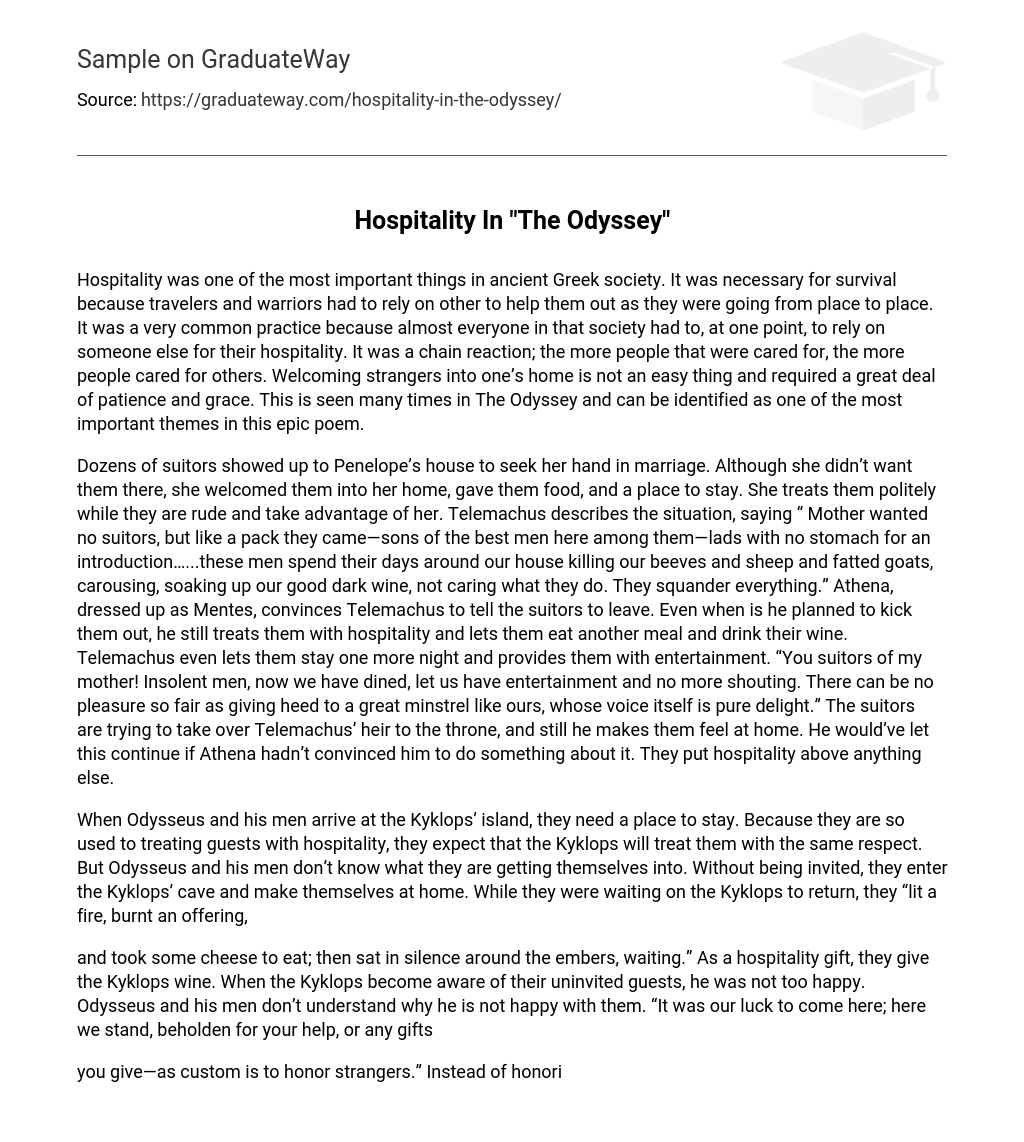Hospitality was one of the most important things in ancient Greek society. It was necessary for survival because travelers and warriors had to rely on other to help them out as they were going from place to place. It was a very common practice because almost everyone in that society had to, at one point, to rely on someone else for their hospitality. It was a chain reaction; the more people that were cared for, the more people cared for others. Welcoming strangers into one’s home is not an easy thing and required a great deal of patience and grace. This is seen many times in The Odyssey and can be identified as one of the most important themes in this epic poem.
Dozens of suitors showed up to Penelope’s house to seek her hand in marriage. Although she didn’t want them there, she welcomed them into her home, gave them food, and a place to stay. She treats them politely while they are rude and take advantage of her. Telemachus describes the situation, saying “ Mother wanted no suitors, but like a pack they came—sons of the best men here among them—lads with no stomach for an introduction……these men spend their days around our house killing our beeves and sheep and fatted goats, carousing, soaking up our good dark wine, not caring what they do. They squander everything.” Athena, dressed up as Mentes, convinces Telemachus to tell the suitors to leave. Even when is he planned to kick them out, he still treats them with hospitality and lets them eat another meal and drink their wine. Telemachus even lets them stay one more night and provides them with entertainment. “You suitors of my mother! Insolent men, now we have dined, let us have entertainment and no more shouting. There can be no pleasure so fair as giving heed to a great minstrel like ours, whose voice itself is pure delight.” The suitors are trying to take over Telemachus’ heir to the throne, and still he makes them feel at home. He would’ve let this continue if Athena hadn’t convinced him to do something about it. They put hospitality above anything else.
When Odysseus and his men arrive at the Kyklops’ island, they need a place to stay. Because they are so used to treating guests with hospitality, they expect that the Kyklops will treat them with the same respect. But Odysseus and his men don’t know what they are getting themselves into. Without being invited, they enter the Kyklops’ cave and make themselves at home. While they were waiting on the Kyklops to return, they “lit a fire, burnt an offering,
and took some cheese to eat; then sat in silence around the embers, waiting.” As a hospitality gift, they give the Kyklops wine. When the Kyklops become aware of their uninvited guests, he was not too happy. Odysseus and his men don’t understand why he is not happy with them. “It was our luck to come here; here we stand, beholden for your help, or any gifts
you give—as custom is to honor strangers.” Instead of honoring their request, the Kyklops does the exact opposite; he eats the men. He acts like he is giving Odysseus a “gift” when he waits to kill him before he kills his peers. ”Give me still more, freely, and tell me your name straightway now, so I can give you a guest present to make you happy.” The present is not a present at all.
Unlike the Kyklops’ home, the next island visited by Odysseus and his men is full of hospitality. Kirke welcomes them and treats them like kings. “On thrones she seated them, and lounging chairs, while she prepared a meal of cheese and barley and amber honey mixed with Pramnian wine.” This description shows how welcoming she was; she was even willing to share wine, which was hard to come by, with them. Although she is spoiling them, she does it for her own use, showing she does have ulterior motive. On the other hand, the Phaiakians treat odysseus with great hospitality out of their own good, not just because they want something from him like Kirke did. They welcome Odysseus and his men with a feast and gold bars. “But now that you have taken refuge here you shall not lack for clothing, or any other comfort due to a poor man in distress.” They welcome him this way because it is custom and they know it looks for them. They have also relied on strangers for help in the past. They admit this, saying, “Could we have made it home again—and Zeus give us no more hard roving!—if other men had never fed us, given us lodging? Bring these men to be our guests: unhitch their team!” This shows that hospitality is a chain reaction and that the more people they welcome, the more people will welcome others.
In conclusion, hospitality was much more a way of life in ancient Greece than it is now. It was important for survival during that time, but this type of hospitality would be very dangerous in modern society. As times have changed, the hospitality traditions have changed, too. Although the practices have changed, it is still very important to be welcoming to guests and treat them like royalty. This shows that while times change, basic manners and kindness don’t.





